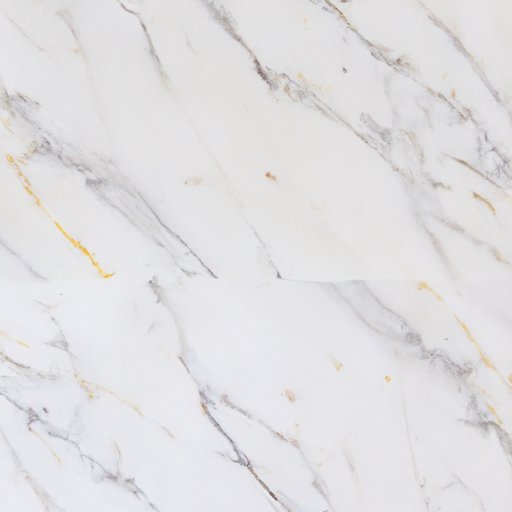Introduction
Cultured marble is a popular building material used for countertops, shower walls, and other surfaces around the home. It has a glossy, polished look that can make any room look modern and sophisticated. But does cultured marble stain easily? In this article, we’ll explore this question as well as the pros and cons of using cultured marble in your home.
What is Cultured Marble and Does it Stain Easily?
Cultured marble is a man-made material made from a mixture of crushed limestone and polyester resin. It is often used as a substitute for natural marble, which is a more expensive option. There are several types of cultured marble available on the market, including solid surface, engineered stone, and quartz composite.
Cultured marble is created by combining the limestone and resin in a mold. The mixture is then heated and cured, resulting in a durable, hard surface with a glossy finish. The surface of cultured marble is nonporous, so it is resistant to staining and discoloration.
However, it is important to note that cultured marble can still stain if not properly cared for. Certain substances, such as acids, can cause discoloration or etching on the surface of the marble. Additionally, the surface can become scratched or chipped over time.
Pros and Cons of Using Cultured Marble in Your Home
Cultured marble offers several benefits to homeowners. First, it is relatively inexpensive compared to natural marble. It is also easy to install and comes in a variety of colors and patterns, allowing you to customize the look of your home. Finally, it is easy to maintain and resists staining and discoloration better than other materials.
On the other hand, there are some drawbacks to using cultured marble in your home. The surface can be scratched or chipped more easily than other materials, and it can be difficult to repair any damage that occurs. Additionally, it may not be as durable or long-lasting as other materials, such as granite or quartz.
Is Cultured Marble the Right Choice for You?
When deciding whether to use cultured marble in your home, there are several factors to consider. If you are looking for an affordable and stylish material for your home, cultured marble may be a good choice. However, if you are looking for a material that is more durable and less likely to scratch or chip, you may want to consider other options.
Other materials to consider include granite, quartz, laminate, and tile. Each of these materials has its own set of pros and cons, so research them carefully before making a decision.

How to Clean and Maintain Cultured Marble to Avoid Stains
To keep your cultured marble looking its best and prevent staining, it is important to follow a regular cleaning routine. For daily cleaning, use a mild soap and warm water to wipe down the surface. Make sure to rinse the soap off thoroughly and dry the surface with a soft cloth. Avoid using abrasive cleaners or scrubbers, as these can scratch or dull the surface.
For tougher stains, you can use a mixture of baking soda and water to gently scrub the area. Afterward, rinse the surface with water and dry with a soft cloth. You should also use coasters and placemats when placing hot items on the surface to avoid heat damage.
Can You Paint or Seal Cultured Marble to Improve Its Stain Resistance?
Painting or sealing cultured marble can help improve its stain resistance and make it easier to clean. However, there are some drawbacks to doing this. Painting or sealing the surface can make it more prone to scratches and chips, and it can also reduce the shine and luster of the marble.
If you decide to paint or seal your cultured marble, it is important to use a product specifically designed for this purpose. Follow the instructions on the package carefully and apply multiple coats for the best results.
Conclusion
Cultured marble is a popular building material that offers a stylish, affordable option for homeowners. While it is generally resistant to staining, it is important to clean and maintain it properly to ensure it looks its best. Painting or sealing the surface can help improve its stain resistance, but it can also reduce the shine and luster of the marble.
When deciding whether to use cultured marble in your home, consider the benefits and drawbacks carefully. If you are looking for an affordable and stylish material, it may be a good choice. However, if you are looking for something more durable, you may want to consider other materials, such as granite, quartz, laminate, or tile.
(Note: Is this article not meeting your expectations? Do you have knowledge or insights to share? Unlock new opportunities and expand your reach by joining our authors team. Click Registration to join us and share your expertise with our readers.)
